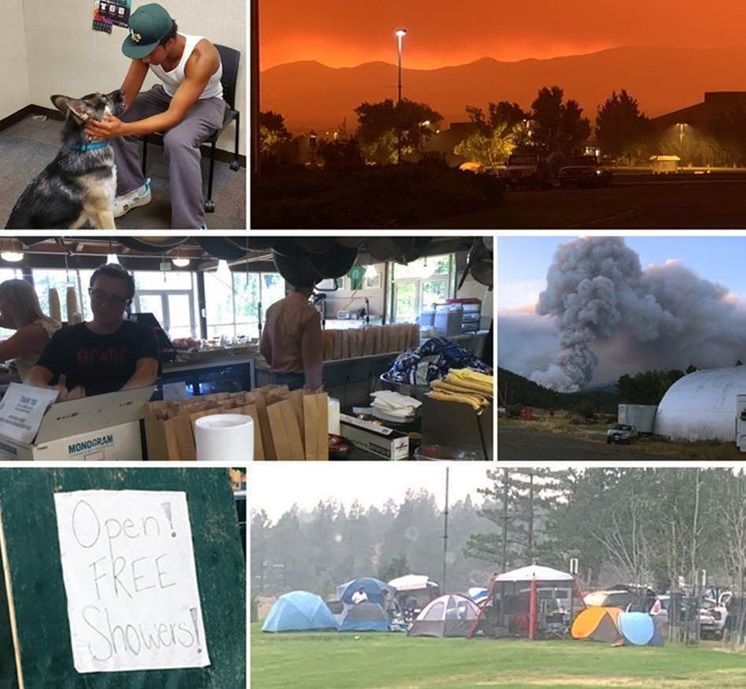
Aug. 12, 2021 - Vision in Action No. 44

FOUNDATION FOR CALIFORNIA COMMUNITY COLLEGE RELAUNCHES RELIEF FUND FOR COLLEGES, STUDENTS, FACULTY AND STAFF IMPACTED BY WILDFIRES
California’s single largest wildfire in recorded history continued to grow overnight, after burning more than 1,000 buildings – nearly half of them homes – in Butte, Lassen, Plumas and Tehama counties in the northern Sierra Nevada.
The Dixie Fire, which started July 14, now covers 783 square miles and is just 30% contained. The cause is under investigation.
This fire, along with others that have sparked recently across Northern California, are greatly affecting operations at several California community colleges, including Butte College, College of the Siskiyous, Feather River College, Lake Tahoe Community College and Lassen Community College. Students, staff and faculty at Feather River College and Lassen Community College are directly impacted by the fires, and colleges are opening their campuses to assist with emergency response and evacuation.
To help, the Foundation for California Community Colleges has established a statewide fund that will help California Community Colleges students and staff recover from wildfires. Dollars will be used to help students overcome new barriers to education resulting from fires and displacement, including to replace essential supplies such as laptops, books, backpacks, and will provide emergency aid relief for the most deeply affected staff and faculty.
Funds will be distributed to college foundations providing emergency and recovery assistance to impacted individuals. Colleges will be awarded based on need, through a simple application process.
For questions, please reach out to the Foundation.
“EMERGENCY PREPAREDNESS” LEARNING MODULE HELPS COLLEGES PREPARE FOR ANY CRISIS
As California and other states in the west face devastating fires this summer, colleges are reminded that a crisis can happen at any time and preparation is critical.
“When a crisis hits, it hits quickly. You are suddenly needing to make decisions with limited information,” Dr. Samia Yaqub, superintendent and president of the Butte-Glenn Community College District, explained in the Vision Resource Center learning module, “Emergency Preparedness.”
She and nine Butte College administrators shared the lessons they have learned responding to crises over the years, including the state’s deadliest and most destructive fire, the 2018 Camp Fire.
The Emergency Preparation module is a robust series of conversations describing how different areas of an organization can prepare for any emergency. Topics include coordinating instruction, counseling, facilities, finances, instruction, instructional space, leadership, public information, risk management, student communications and student services.
The tips and recommendations may reinforce what campuses are already doing, such as building a response team and practicing scenarios. Other recommendations might provide new ideas, such as:
- Create a list of experts at other colleges who can offer guidance in an emergency, as well as a list of experts on your campuses who have institutional knowledge.
- Plan to create one central location for students, faculty, staff and the media to find the most current news and information, such as the college homepage.
- Maintain a reserve fund and gain the authority to use it to ensure operations can continue during an emergency.
To learn more about how to prepare for a crisis, log in to your college’s portal to the Vision Resource Center and search for the “Emergency Preparedness” learning module. You also can enter your college email address on the Vision Resource Center and you will be directed to your login page. If you don't have an account, you will be prompted to register with your college email.

System Guidance/News/Webinars
The Chancellor’s Office and POST (Peace Officer Standards and Training) webinar series continues on Tuesday, August 17 from 12:00 – 1:30 p.m.
Women make up just over 50% of the United States population, yet only 12% of officers and 3% of police leaders are women. Women play an important role in policing, as studies suggest that female officers use less force, engage in fewer incidents of misconduct, and improve public safety outcomes. This panel will discuss the past, present, and future of women in policing, focusing on why and how to improve gender diversity at all levels.
Join the Workforce and Economic Development Division Monthly Update Webinar Series for an overview of the Fiscal Year 2021-22 Workforce funding and new trailer bill language for the Strong Workforce Program (SWP). The webinar is Wednesday, August 25 from 11:00 a.m. – 12:00 p.m. The presentation will be focusing on:
FY 21-22 Workforce Funding
Updates to SWP
NOVA Updates for SWP
Key Deadlines
Register here.
The next Chancellor’s Office System Webinar will take place on Wednesday, September 1 from 9:00 – 10:00 a.m. If you are already registered for the Chancellor’s Office System Webinars, there is no need to register again. You will receive a reminder email prior to the webinar with your link.
The recording and slides from the previous webinar - Leading Courageous Conversations about Equitable Placement - will be posted on the Vision Resource Center. After logging-in, under the “Communities” menu, visit “All Communities” and look for “CCC | Webinars, Conferences, and Events”. Join this community, then access the “Chancellor’s Office System Webinars” topic to view the content.
Please share the 2021 System Webinars registration link with your colleagues that are not yet registered. (Registration is only required once and the same link will be used to access all System Webinars in 2021.)
The Chancellor’s Office is committed to keeping everyone informed during this uncertain time. We encourage administrators, faculty, staff and students to regularly check the Chancellor’s Office COVID-19 resource page and the Chancellor’s Office Communications to Colleges section for ongoing executive orders, guidance memos and announcements. Current and prospective students can also get connected with their local college to find out specific resources and support services available as well as enroll in their local community college.
Student Supports
New stimulus money is available for current and former foster, dual status, Title IV-E tribe and probation youth ages 18-26. The money is guaranteed if students are eligible and sign up by the deadline. All applications must be submitted by September 3, 2021.
The California Youth Crisis line runs 24-hours a day, seven days a week: 800-843-5200. The National Suicide Prevention Lifeline provides confidential assistance to anyone in crisis and their loved ones through a live chat and free 24-hour hotline at 800-273-8255. You can also text COURAGE to the Crisis Text Line at 741741.
Items of Interest
California requires vaccines, tests for teachers and staff
San Francisco to become first major U.S. city to mandate full vaccination for many indoor activities
Why this stage of the pandemic makes us so anxious
Biden administration rolls back DeVos rule limiting state authority over student loan companies

